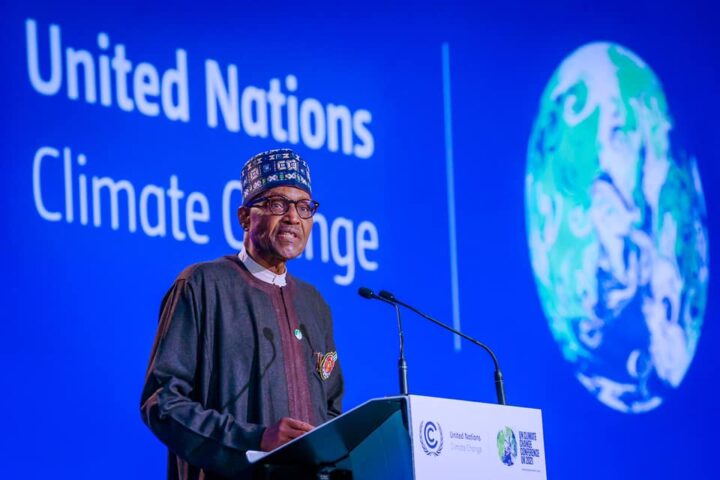President Muhammadu Buhari says Nigeria aims to achieve net-zero emissions by 2060.
Net zero emission means ensuring that the amount of greenhouse gas produced is equivalent to what is removed from the atmosphere.
This means that as carbon is being released, it is also being removed from the atmosphere such that emissions are reduced to zero in order to stabilise global temperatures.
While Nigeria aims to achieve net-zero by 2060, it is coming 10 years later than the United Nations-approved target.
Advertisement
The UN had said global carbon dioxide emissions would need to reach net zero around 2050 to limit the disastrous effects of climate change.
Speaking on Nigeria’s plans during the climate change conference in Glasgow on Tuesday, Buhari said climate change is ravaging all regions of Nigeria and the country is committed to tackling its impacts.
He said: “There is an urgent need for action on the environment. Desertification in the north, floods in the centre. Pollution and erosion in the coast are enough evidence. For Nigeria, climate change is not about the affairs of tomorrow but what is happening today,” he said.
Advertisement
“Nigeria is committed to net-zero by 2060. In our lifetime, Lake Chad has gone from a vast expanse of biodiversity to a shadow of itself. We are investing in renewable, hydro dams and solar projects.”
Commenting on the Paris Agreement which requires nations to move from fossil fuel to clean energy, Buhari said Nigeria’s revised national determined contributions (NDCs) prioritises sectors that can help the country achieve the transition.
The president however said the country needs financial support and funding to be able to meet its ambitions for climate energy transition.
“We are looking for partners in innovation, technology and finance to make cleaner and efficient use of all available resources to help us make a stable transition in the energy market,” he said.
Advertisement
“The revised NDCs has additional priority sectors – water and waste, nature based solutions, adaptation and resilience, vulnerability assessment, a clean cooking agenda, green job assessment, and a bottom-up renewable energy transition pathway by 2030.”






